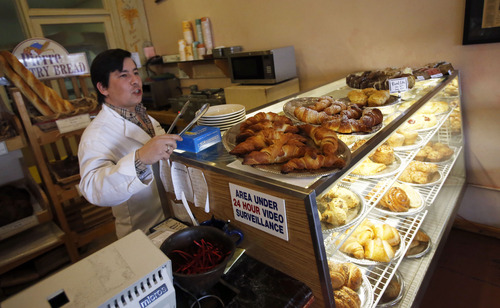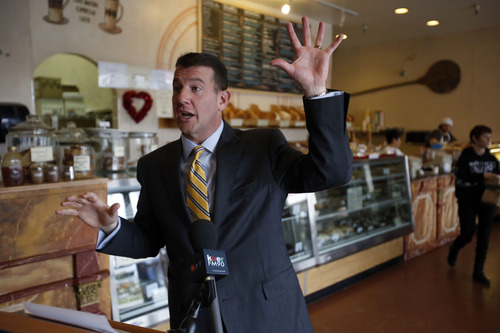This is an archived article that was published on sltrib.com in 2013, and information in the article may be outdated. It is provided only for personal research purposes and may not be reprinted.
Utahns' confidence in the economy fell slightly in March but not enough to suggest that consumer attitudes have changed much in the past six months, despite a host of challenges.
The Zions Bank Consumer Attitude Index declined 1 point in March, to 78.9, while the national Consumer Confidence Index declined 8.3 points, to 59.7.
Economist Randy Shumway, CEO of the Cicero Group that tracks Utahns' sentiments for Zions, said the decline was within the margin of error and statistically insignificant. "It doesn't represent a change in consumer attitudes," he said.
Still, the index for Utah remains well below a reading of 90, which indicates that in the minds of most Utah consumers the economy has yet to regain all its health.
"We've been in that gray area between 70 and 90 for far to many months," Shumway said. "Utah has so many positive things going for it economically — an unemployment rate of 5.2 percent, a housing market that is in a real recovery and increasing retail sales — but the continued fiscal gridlock in Washington continues to weigh on people's minds."
Nationally, Americans were less confident in the economy this month than in February as massive government spending cuts stoked economic uncertainty.
This month's decline in the national Consumer Confidence Index put out by The Conference Board, a New York-based private research group, represents just the latest swing in the way Americans feel about the economy and their future prospects.
The national index is closely watched by economists because it is a monthly gauge of how Americans are feeling about their jobs, incomes and other bread-and-butter issues. And that's important because consumer spending accounts for 70 percent of U.S. economic activity.
Lynn Franco, director of economic indicators at The Conference Board, said anxiety about the recent $85 billion in across-the-board government spending cuts that took effect March 1 "created uncertainty regarding the economic outlook" and contributed to the decline in the national numbers.
Although burdened by some of the same fears, Utah consumers remained slightly more optimistic than their counterparts elsewhere.
Andre Tsalpatouros, the owner of Pierre Country Bakery in Salt Lake City, said his experience so far this year has been a little different that what the raw numbers would suggest.
Many of his customers appear to be less concerned about the economy than they were last year at this time, he said. "As an artisan bakery, we sell small luxury items, and our customers lately seem more willing to spend a little more on themselves."
Elsewhere in the country, things are different.
Scott Brown, chief economist at the investment firm of Raymond James, said the March drop in the confidence index "likely reflects the impact of higher gasoline prices, as well as the higher payroll tax.
Although that payroll tax increase kicked in three months ago, its effect may just now be sinking in for some people, he said.
The Conference Board also reported that the proportion of people expecting business conditions to improve over the next six months fell to 14.4 percent from 18 percent a month earlier.
And that seems to run counter to a separate Commerce Department report on durable goods that was released Tuesday. It noted that manufacturing activity has provided a boost to the economy so far this year. Factories were busier than ever in February.
February's increase was driven by a surge in commercial aircraft orders, which tend to be volatile. Still, orders for motor vehicles and parts increased solidly, suggesting demand for cars and trucks remains strong.
The Associated Press contributed to this story.





